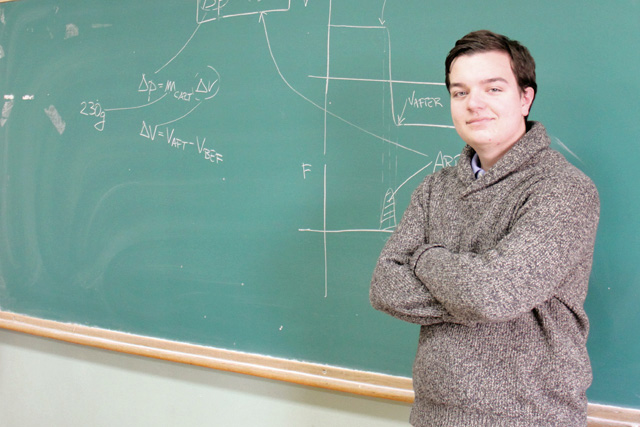For Second Consecutive Year, a Regis Senior is Named an Intel Science Talent Search Semifinalist
Above: John Clarke in the Regis Physics Laboratory after being named an Intel Science Talent Search semifinalist.
Last week, senior John Clarke '14 received some unexpected but well deserved news. The Intel Science Talent Search named him a semifinalist in the 2014 Search competition. Clarke's Earth and Planetary Science project is titled, "High-Energy X-ray Emission in the Jovian Magnetosphere: A Feasibility Study for the Nuclear Spectroscopic Telescope Array (NuSTAR)". The ranking as a semifinalist awards him $1,000 and Regis High School will receive a matching gift of $1,000. He is now one of a small group of students nationwide eligible to be named a finalist.
The Intel Science Talent Search (Intel STS) is the nation's most prestigious pre-college science competition. Only 300 students are announced as semifinalists each year. From these semifinalists, 40 finalists are then invited to Washington, DC in March to participate in final judging, display their work to the public, meet with notable scientists, and compete for the top award of $100,000. A list of the 300 students and their projects was published by Newsday last week (Meet Long Island's 2014 Intel Semifinalists | January 2014).
Clarke's interest in the program began a few years ago, when he was introduced to the competition by hometown neighbors in Syosset. Then last year, a project by William Kindschuh '13 earned recognition as a 2013 Intel Science Talent Search semifinalist with his project: "Comparison of a Hospital-Wide Antibiogram to that of an Associated Long Term Care facility". Kindschuh's success motivated Clarke to learn more about the competition. Clarke found himself drawn to both the ability to be recognized for research and the friendly competition that the talent search presented.
Before beginning his research at Columbia University, Clarke's mentor, Dr. Charles Hailey, offered two opportunities: to either analyze galactic center data recorded by the Nuclear Spectroscopic Telescope Array (NuSTAR)--the first space-based telescope that focuses high-energy X-rays--or to find something new in the solar system for the NuSTAR to observe.
"I chose the latter opportunity," said Clarke, "because of its inherent freedom and the mystery of not knowing what I would find. Ultimately, after extensively simulating and cataloging X-ray sources with graduate student Melanie Nynka, I focused my attention to the putative, high-energy X-ray emission present in the Jovian magnetic field, or magnetosphere. In particular, I researched the X-rays that emanate from the Jovian aurorae, a type of phenomenon whose visible version we see on Earth as the Aurora Borealis."
Clarke's interest in this topic began in his Junior year at Regis. During that time, he undertook an investigation of solar activity as an upperclassman researcher in the Science Research Project (SRP). To familiarize himself with the relevant scientific concepts, he was referred a few texts by Dr. Luca Matone, a faculty member in the Regis science department.
"I learned that essentially all interesting solar activity phenomena like sunspots and prominences are the result of intense magnetic activity. This got me interested in magnetic field dynamics. This interest coupled with my fascination of our closest gas giant inspired me to study its magnetic field, one that, if visible to the human eye, would appear larger than the Moon!"
Clarke credits much of his preparation for the Intel challenge to his education and experience as a Regian. "Undoubtedly, my science education at Regis, especially in the physical sciences, prepared me to understand the astrophysical and geophysical science I encountered over the summer. I found myself calling upon essential scientific principles that I had learned during my chemistry and physics classes to understand these new sciences. My past SRP mentors Mr. Marcucio and Dr. Matone also taught me to be critical, thorough, and organized in my research, traits that were especially necessary for the successful undertaking of my investigation."
For Clarke, the recognition as a semifinalist has been humbling. "I was honored when I learned that I had been named a semifinalist. It was a great feeling to be recognized after months of persistent and hard work."
Read more Regis news
